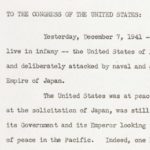The American Bar Association Dialogue program provides lawyers, judges and teachers with the resources they need to engage students and community members in a discussion of fundamental American legal principles and civic traditions. This Dialogue on the Fourteenth Amendment is composed of three parts:
Part 1: Equal Protection and Civil Rights – Participants discuss the equal protection clause of the 14th Amendment and consider how Congress, through federal legislation, has worked to help realize its constitutional promise.
Part 2: Incorporating the Bill of Rights examines the concept of incorporation. Using a case study of Gitlow v. New York, this section provides a guide to how courts have applied the Bill of Rights, selectively, to the states using the 14th Amendment.
Part 3: Ensuring Equality and Liberty explores how the 14th Amendment has been interpreted by courts to protect fundamental freedoms, including individuals’ right to marry.
Founding Documents
Discover the documents at the bedrock of our nation’s founding and understand the fundamental ideas from each of the documents, and the major principles of the U.S. Constitution. Primary sources include the Declaration of Independence, Articles of the Confederation, the Constitution and the Bill of Rights, Federalist papers (#51, #70, #78), Brutus #1, and the amazing Letter from the Birmingham City Jail. Check out the National Constitution Center’s learning module for more resources!
We the People Open Course
This course takes you from the philosophical foundations of the U.S. Constitution through the modern interpretation and application of its ideals. You will find videos of noted scholars explaining key aspects of the Constitution and online exercises to check for understanding. The course follows the We the People: The Citizen & the Constitution Level 3 (high school) textbook, which has been used throughout the country to further understanding of our government and its fundamental principles.
Letter to James Madison
This letter from Thomas Jefferson to James Madison in September, 1789 focuses on human rights and the principles of every government. The question: Whether one generation of men has a right to bind another, seems never to have been started either on this or our side of the water. Yet it is a question of such consequences as not only to merit decision, but place also, among the fundamental principles of every government. The course of reflection in which we are immersed here on the elementary principles of society has presented this question to my mind and that no such obligation can be transmitted I think very capable of proof.
Congress, the President, and the War Powers (Fundamental Principles of Government)

This lesson will explore the implementation of the war-making power from the first declared war under the Constitution—the War of 1812—to the Iraq War. Using primary sources, students will investigate how the constitutional powers to initiate war have been exercised by the legislative and executive branches at several key moments in American history. They will also evaluate why and how the balance of authority in initiating war has changed over time, and the current balance of power.